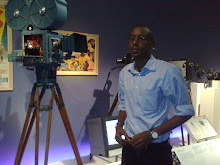
BY LINDA MBABAZI
23-year-old Pierre Kayitana has earned himself a name in the international movie industry as the director of Rwanda Cinema Centre.
The Rwanda Cinema Centre (RCC), which is situated in Gacuriro was founded by another renowned local cinematographer, Eric Kabera.
Kayitana, has, under his tutelage, seen the steady grow of the Rwanda Film Festival. It has become recognized as one of Africa’s most unique venues for filmmakers to showcase their work.
TNT: When did you join the Rwanda Film industry?
PK: I joined in 2005. This was after I had participated in the first Rwanda Cinema Centre training. We were trained on documentary filmmaking.
TNT: What was your first documentary?
PK: It’s called “Behind These Walls”. It’s a short documentary about Rwanda’s educational system, its challenges and the progress.
The documentary was premiered at the first Rwandan “Mini Film Festival”-an event I volunteered for
TNT: How can you describe the trajectory of your careers so far?
PK: I have developed a strong passion for filmmaking, and gotten the chance to work with both local and international filmmakers.
In 2006, I starred in the film “Shake Hands with the Devil”, a film adaptation of the Romeo Dallaire autobiography of the same name.
These opportunities have generated more work for me as a production manager and film maker.
TNT: What are some of your responsibilities as the director of the Rwanda Cinema Centre?
PK: My responsibilities include making sure that we secure the films and venues, establish the programme, develop publicity material, script the events, and recruit volunteers.
I also have to put together project proposal for partnership, create narratives for the events, build the budget and update the festival website.
I have also been involved in more projects and provided services to renowned organizations, like CNN, Al Jazeera English, PBS, and singer Alicia Keys’ initiative “Keep A Child Alive”.
In the year 2008, I coordinated “Pangea Day”, a global event which had Kigali as one of the only 5 cities selected around the world, to host a celebration of films and humanity.
TNT: What is your connection with Tribeca Film Festival?
PK: Two years ago, at the renowned Tribeca Film Festival, I was invited to be one of the ‘Three Voices”, a focus on Rwanda programme.
We participated in the Film Fellows Programme with a special screening and talkbacks, speaking about our works. On the evening that was called ‘Rwanda’s Turn’, President Paul Kagame, spoke about the similarities of the Tribeca Film Festival and Rwanda Film industry.
TNT: Did your experience to the Tribeca Film Festival inspire you?
PK: Yes. I was morally boosted and gained major filming skills. I’m now trying to apply the skills to develop Rwanda’s music industry.
With the growth of the Internet and electronic media across the world, it is becoming increasingly common for businesses to incorporate multimedia elements into their operations.
My experience at Tribeca has been significant, and I’m currently working as an internee at Tribeca, in the youth session, where I’m trained by a team of professionals in film and Media, like Brian Newman-CEO of Tribeca Film Instute, Ellen Newman-TFI deputy director and famous film producers like, Ms.Jane Rosenthal, Mr. Craig Hatkoff and Mr. Robert de Niro.
TNT: What is your vision for Rwanda’s film industry?
PK: The Rwanda film industry, like any other industry in Rwanda has potential. The reason is none other than the will of Rwandans to succeed.
The Rwandan government is supporting efforts that first involve the entire population and the youth in particular.
We cannot forget the huge support and encouragement that Rwanda and our film industry gets from many friends of Rwanda around the world. Again this proves that no help will come until you show interest in something.
Rwanda’s film industry started with our own initiatives and now the world has noticed us. The other major facet of our success is making sure that we excel and add value to everything we do, including films.
We have most of the necessary incentives in a country to succeed such as zero tolerance on corruption, good ICT service, good governance, good scenery that is envied worldwide.
However we have a lot of work to do in building good infrastructure and provide more training for our filmmakers, cameramen, electricians, set designers, writers and more.
Ends

No comments:
Post a Comment